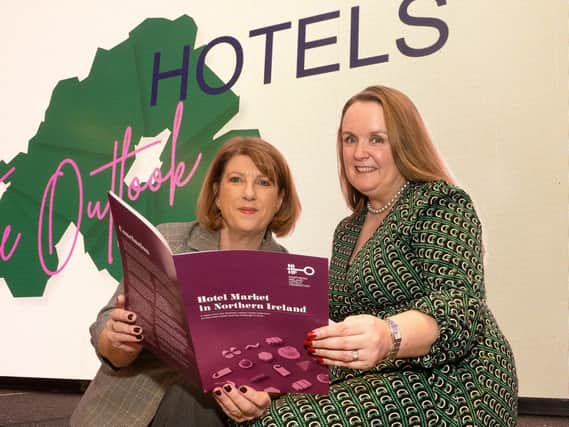New ‘Hotel Market in Northern Ireland’ report reveals how £1 billion invested over the last 20 years has transformed the sector


The Northern Ireland Hotels Federation (NIHF) ‘Hotel Market in Northern Ireland’ report has outlined how the £1 billion invested over the last 20 years has transformed the sector, seeing it double in size.
Launched at Hilton Belfast, the new report also revealed that a further investment pipeline of £300 million is under consideration by developers.
Advertisement
Hide AdAdvertisement
Hide AdThe hotel sector makes a significant contribution to the local NI economy, boosting tourism, jobs and local business. In 2023, it could have a direct payroll of around £250m which would support over 15,000 jobs, according to the report.
Janice Gault, CE, NIHF, explained: “Over the last two decades the hotel sector has almost doubled in size thanks to investment of over £1billion. Today, there are 141 hotels comprising of 9,432 rooms dominated by upper scale four-to-five-star properties. Hotels remain the dominant player in terms of accommodation but new style accommodation products continue to come to market driven by consumer demand and a new appreciation of space and service.
“Other notable trends in the sector are the concentration of larger hotels in urban destinations, the arrival of the resort properties offering, not only traditional hotel accommodation but self-catering, glamping, and independent lodges. Meanwhile, at the other end of the spectrum, branded budget hotels now accounting for 12% of hotel bedstock.
“Forecasts had predicted that there would be over 10,000 bedrooms by 2020. However, Covid-19 brought expansion plans to a halt and the post pandemic pipeline remains sluggish. Despite more than forty projects in the public domain and a further 14 schemes under consideration, or at conceptual stage, it is unlikely that the 10,000-bedroom barrier will be broken until well into 2024. Prospective developers may adjust their original plans exploring new accommodation products or decide to build other commercial projects which may not involve a hotel element. The cost of construction, disruption of the supply chain and interest rates, are all contributing factors.”
Advertisement
Hide AdAdvertisement
Hide AdReviewing performance in the post pandemic operating environment Janice, added: “Performance levels in the main have been strong in 2022 with occupancy levels above 2019, growth in Average Daily Rate (ADR) and RevPAR (Revenue per Available Room). Escalating costs and inflation reduce these to single digit growth with profits being squeezed which is impacting on profitability. 2023 will be a year of balancing the need to cover increasing costs and maintaining staffing at a level which enables hotels to service the business that they have on the books. In 2022, many businesses missed out on potential revenue as they had to curtail and turn away trade due to staffing shortages.”
Concluding Janice, said: “Few sectors have experienced the level of growth seen in the hotel sector and there is still room for growth. The wider sector including restaurants, bars and visitor attractions have made considerable investment which has enhanced the tourism and hospitality landscape. NI could grow as a destination but needs support from government to ensure the industry reaches its full potential. A change in immigration policy, a VAT reduction, and a different approach to attracting people into the industry would all help. Increased promotion has paid dividends attracting record numbers of visitors from the RoI and helped put NI on the tourist trail for visitors from GB. Progress at a destination level has been hard fought and it would be disappointing if this was not built upon or lost due to budget constraints.
"Tourism is transformative. It brings opportunity, economic and social benefits to our society and more. The current pipeline of hotel expansion may have slowed down but interest in the region remains strong. Further investment in the region of £300m is scheduled to materialise over the next three years and this will build upon our offering.”